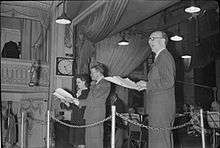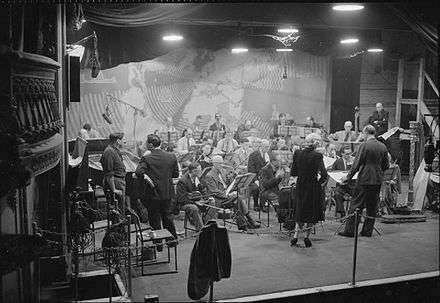It's That Man Again
It's That Man Again (or, commonly, ITMA) is a BBC radio comedy programme which ran from 1939 to 1949. It was written by Ted Kavanagh and starred Tommy Handley in comic situations often related to current war news. It featured popular characters such as Colonel Chinstrap and Mrs. Mopp, and generated certain catchphrases that long outlived the series. ITMA was credited with sustaining wartime morale.
| Other names | ITMA |
|---|---|
| Genre | Sketch comedy |
| Running time | 30 mins |
| Country of origin | United Kingdom |
| Language(s) | English |
| Home station | |
| Syndicates | |
| Starring | Tommy Handley |
| Written by | Ted Kavanagh |
| Produced by | Francis Worsley |
| Recording studio |
|
| Original release | 12 July 1939 – 13 January 1949 |

History
The title ITMA refers to a contemporary phrase concerning the ever more frequent news-stories about Hitler in the lead-up to the Second World War, and specifically a headline in the Daily Express written by Bert Gunn.[1] The first show was broadcast on 12 July 1939, part of an initial run of four shows which were fortnightly.[2]

Catchphrases
ITMA is remembered for a number of catchphrases, some of which entered popular vocabulary.[3]
- "Don't forget the diver"[3] – spoken by Horace Percival upon entrance and exit as a diver. This became a very popular catchphrase in Britain during the Second World War.[4]
- This catchphrase was apparently inspired by a diver who solicited pennies on pier from seaside crowds, saying "Don't forget the diver sir. Every penny makes the water warmer".[5]
- New Brighton is a sea-side resort on the Wirral Peninsula. During the late '40s, during the holiday season, there was a man on a bicycle on the landing stage of the New Brighton Ferry from Liverpool. When the ferry approached, he rode off the end of the landing stage, some 10 to 20 ft (3 to 6 m), into the River Mersey. His accomplice stood on the stage with a collecting box and cried out "Don't forget the diver." as the passengers left the boat.
- "I'm going down now sir" – Another diver catchphrase, which became widely used in descending lifts during the era of ITMA popularity.[4]
- "This is Funf speaking" – German spy, spoken by Jack Train.[3] This became a popular telephone catchphrase.[6]
- "Don't mind if I do" – Colonel Humphrey Chinstrap's catchphrase, spoken by Jack Train, turning any remark into an offer of a drink.[3] The origin of this catchphrase precedes ITMA, but was nevertheless popularised by ITMA.[7]
- "I go, I come back" – Middle Eastern vendor, Ali Oop. Spoken by Jack Train.[3][8]
- "It's being so cheerful as keeps me going" – Mona Lott, a depressed laundrywoman played by Joan Harben.[9]
- "Good morning, nice day" – commercial traveller about to offer some sales line.[10][11]
- "After you, Claude – no, After you Cecil" – Moving men spoken by Jack Train and Horace Percival.[3][12] This phrase became used by RAF pilots as they queued for attack.[13]
- "I'll have to ask me Dad" – Mark Time (an elderly ditherer). This "was a political phrase introduced into ITMA when post-war reconstruction was looming."[14] It was spoken by a Jack Train character, Mark Time, who responded to all questions with this phrase.[3]
- "But I'm all right now" – Hattie Jacques' character Sophie Tuckshop, after describing a long list of food she had eaten.[3][15]
- "Can I Do You Now, Sir?" and "TTFN (Ta ta for now)" – Spoken by Dorothy Summers' character, Mrs Mopp.[3][16][6]
Diana Morrison's "D'oh"
More an ejaculation than catchphrase, "D'oh!" was the explosive parting shot of the character Miss Hotchkiss as played by Diana Morrison in numerous episodes from 1945 (series 8/166 onwards)[17] through to the demise of the programme in January 1949.[18] Miss Hotchkiss was Tommy Handley's stentorian and authoritarian secretary; her surname was taken from a make of machine-gun.[19] Despite her authoritarian nature, she was susceptible to the amorous blandishments of Handley. However, these would inevitably lead to a put-down,[20] and an explosive "D'oh!" would signal Hotchkiss' exasperated exit.[21]
"D'oh!" was added to the Oxford English Dictionary in 2004, largely in response to its much later popularisation in the television programme The Simpsons, although ITMA is credited with the earliest recorded use of the term.[22]
Evergreen magazine list of characters
In their spring 2010 issue, the article about ITMA listed the following identities:
- Tommy Handley: Himself
- Clarence Wright: Commercial Traveller, Man from the Ministry and Inspector Squirt
- Fred Yule: Johann Bull, George Gorge, Norman the Doorman, Andrew Geekie, Bigga Banga, Mr. Grooves, Walter Wetwhite and Atlas
- Horace Percival: Ali Oop, Cecil, Percy Pintable, the Diver and Mr. Whatsisname
- Hattie Jacques: Ellie Phant, Guide and Sophie Tuckshop
- Maurice Denham: Vodkin, Mrs Lola Tickle (Tess) & the Announcer for Radio Fakenburg
- Jack Train: Bookham, Bowing, Claude, Colonel Chinstrap, Funf the Spy, Fusspot, Farmer Jollop, Wide Boy, Prattle, Hari Kari, Luke Slippy, Lefty and Mark Time
- Dino Galvani: Signor So-So
- Dorothy Summers: Mrs Mopp and First Posh Lady
- Sam Costa: Lemuel
- Celia Eddy: Cilly the Secretary
- Vera Lennox: Dotty (Cilly's sister) and Second Posh Lady
- Sydney Keith: Sam Scram
- Bryan Herbert: Butch (Sam's brother)
- Lind Joyce: Banjeleo, Pam (Sam's sister)
- Molly Weir: Tattie Mackintosh and Mrs Mackintosh
- Diana Morrison: Miss Hotchkiss, Nanny and Aunt Sally
- Jean Capra: Poppy Poopah, Effie and Naieve
- Hugh Morton: Brigadier Dear, Scraping, Basil Backwards, Wool, Josiah Creep, Sam Fairfechan, Announcer and Wamba M'Boojah
- Carleton Hobbs: Curly Kale and Major Munday
- Joan Harben: Mona Lott
- Bill Stephens: Admiral and Comical Chris
- Mary O'Farrell: Lady Sonely, Ruby Rockcake and Nurse Riff-Rafferty
- Paula Green: "Ever So" Girl
- Deryck Guyler: Dan Dungeon, Frisby Dyke, Sir Short Supply and Percy Palaver
- Tony Francis: Reg Raspberry
References
- Wintour, Charles (3 January 2008). "Gunn, Herbert Smith [Bert]". Oxford Dictionary of National Biography. Oxford University Press. doi:10.1093/ref:odnb/48275.
It was there that he created the headline referring to Hitler as 'It's that man again', which afterwards became the title for Tommy Handley's long-running radio show ITMA.
- Wilmut, Roger (26 September 1985). Kindly Leave the Stage!: Story of Variety, 1919–1960. Methuen. p. 132. ISBN 978-0-413-48960-9. Retrieved 2 September 2019.
- "Local History Liverpool | I don't mind if I do". BBC. July 2002. Retrieved 6 January 2019.
- Partridge, Eric (2005) [1977]. "Don't forget the diver!". A Dictionary of Catch Phrases: British and American, from the Sixteenth Century to the Present Day (2nd ed.). Abingdon-on-Thames: Taylor & Francis. p. 108. ISBN 9780203379950.
- Lewis, Peter (1986). "Don't forget the diver". A People's War. Thames Methuen. p. 184. ISBN 978-0423019506.
- Freedman, Jean Rose (1999). "Chapter 3. Careless Talk Costs Lives: Speech in Wartime London.". Whistling in the Dark: Memory and Culture in Wartime London. University Press of Kentucky. pp. 68–69. ISBN 0-8131-2076-4.
- Partridge 2005, p.211
- Partridge 2005, p.214
- Partridge 2005, p.263
- Aldgate, Anthony; Richards, Jeffrey (2007). "Chapter 4. Raise a Laugh: Let George do it". Britain Can Take It: British Cinema in the Second World War. London: Bloomsbury Academic. p. 92. ISBN 978-1-84511-445-9.
- Partridge, Eric (2002), "Good morning — nice day!", in Beale, Paul (ed.), A Dictionary of Slang and Unconventional English: Colloquialisms and Catch Phrases (8th ed.), Abingdon-on-Thames: Routledge, p. 1384, ISBN 9780415291897
- Partridge 2005, p.3
- Curran, James; Seaton, Jean (1997), "Chapter 9. Broadcasting and the blitz", Power Without Responsibility: The Press and Broadcasting in Britain (5th ed.), London: Routledge, p. 135, ISBN 0-415-16810-4
- Briggs, Asa (1961). The History of Broadcasting in the United Kingdom. Volume 3: The War of Words. Oxford University Press. ISBN 978-0192129567.
- Partridge 2005, p.60
- Ferguson, Rosalind (1994), "ta-ta for now!", Shorter Dictionary of Catch Phrases, London: Routledge, p. 125, ISBN 0-415-10051-8
- The ITMA Years, A Compilation of Scripts: 2/13, 4/28, 5/8, 8/34, 9/17, 12/6 (Woburn Press, 1974)
- The Last ITMA Script, Author Kavanagh (Riddle Books, 1949)
- Kavanagh, P J. The ITMA Years.
- BBC Sound Archive 1947.12.04 (BBC Audiobooks Ltd ISBN 0563504390 ℗1988, ©1988 & 2005)
- British Library Sound Catalogue Find Formats [Diana Morrison] T5636R 1947.12.04, C353/17 1945.5.10 and T3670W 1947.11.07, 1948.09.23 & 1949.01.06
- "Ay caramba! A look at some of the language of The Simpsons". Oxford Dictionaries Blog. Oxford University Press. 17 April 2013. Retrieved 6 January 2019.
- Mann, Jean, MP for Coatbridge (19 February 1947). "Civil Estimates, Supplementary Estimate, 1946–47: Broadcasting". Parliamentary Debates (Hansard). 433. Parliament of the United Kingdom: House of Commons. col. 1249.
The comedians of the B.B.C. seem content with smutty sex jokes. Today, 70 per cent. of their wireless programmes are based on jokes of this kind. If families are sitting with us we feel we want to switch off. The greatest insult of all to Scotland is the introduction of a Scots girl to "Itma" who is supposed to he falling head over heels for a little "twerp" called "The Governor."
- "B.B.C. Comedian Called a "Twerp"". Canberra Times. 21 (6200). 21 February 1947. p. 1 – via Trove.
The word "twerp," was heard for the first time in the House of Commons when Mrs. Jean Mann, during the debate on the supplementary estimates, used it in referring to the B.B.C.'s most publicised comedian Tommy Handley, in his programme, entitled "Itma.
External links
| Wikimedia Commons has media related to It's That Man Again. |
- It's That Man Again at BBC Programmes

- It's That Man Again at BBC Online
- It's That Man Again at British Comedy Guide
- British Comedy and Drama Website – ITMA
- Whirligig-TV article about ITMA
- "It's That Man Again". RadioEchoes. 1940–1949.CS1 maint: date format (link) 59 episodes.